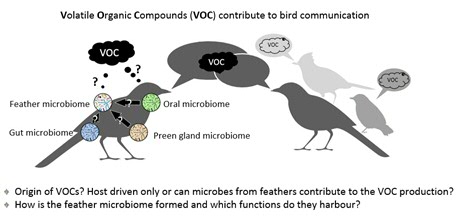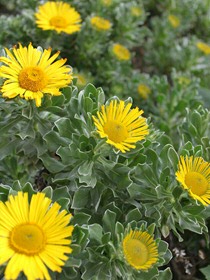Twee ENW-KLEIN-subsidies bij GELIFES
Prof. dr. Irene Tieleman en prof. dr. Joana Falcão Salles, beide van GELIFES, hebben een ENW-KLEIN-subsidie ontvangen van de Nederlandse Organisatie voor Wetenschappelijk Onderzoek (NWO) ter waarde van 710.000 euro. De subsidie is voor hun project ‘Microbiome-mediated functions of avian preen glands: understanding the chemosignalling and antimicrobial potentials’. Daarnaast heeft prof. dr. Rampal Etienne (GELIFES) als mede-aanvrager een ENW-KLEIN-subsidie ontvangen. Samen met Dr. Frederic Lens van Naturalis ontvangt hij 708.000 euro voor het project ‘Untangling species diversification on islands: the role of traits’.
Prof. dr. Tieleman en prof. dr. Falcão Salles | ‘Microbiome-mediated functions of avian preen glands: understanding the chemosignalling and antimicrobial potentials’:
Vogels huisvesten diverse gemeenschappen van micro-organismen, die belangrijke positieve functies vervullen voor hun gastheren. Er gaan daarom wetenschappelijke stemmen op om niet langer te spreken van vogels/dieren, maar van ‘meta-organismen’ – onafscheidelijke samenlevingsvormen van dieren met hun micro-organismen. Tot nu toe zijn vooral de micro-organismen uit het darmsysteem onderzocht. Dit project onderzoekt welke bacteriën in stuitklieren van vogels leven, en wat – via poetsen van veren – de bijdragen van deze bacteriën zijn aan de communicatie tussen vogels en aan de antibacteriële bescherming van hun verenkleed. De onderzoekers verwachten een verband tussen de microbiële functies en de levensloopstrategieën van de vogels.


Dr. Frederic Lens (Naturalis) en prof. dr. Rampal Etienne | ‘Untangling species diversification on islands: the role of traits’:
Door hun isolatie en goed afgebakende grenzen worden eilanden beschouwd als een ideaal systeem om evolutionaire processen te ontrafelen die aanleiding hebben gegeven tot de hedendaagse biodiversiteit. Maar waarom sommige planten en dierengroepen soortenrijk zijn terwijl anderen slechts één soort bevatten is nog steeds één van de cruciale onopgeloste vragen binnen het biodiversiteitsonderzoek. Daarom willen Lens en Etienne een nieuw theoretisch eilandmodel ontwikkelen dat de impact van kenmerken op soortvorming en uitsterven van soorten bestudeert, aan de hand van de meest voorkomende plantenfamilie op eilanden (zonnebloemfamilie) en de best bestudeerde eilandengroep (Canarische Eilanden).
ENW-KLEIN
De ENW-KLEIN-subsidie biedt onderzoekers de mogelijkheid om wetenschappelijke innovaties tot stand te brengen die de basis kunnen vormen voor onderzoeksthema's van de toekomst.
Meer nieuws
-
17 februari 2026
De lange zoektocht naar nieuwe fysica
-
10 februari 2026
Waarom slechts een klein aantal planeten geschikt is voor leven
